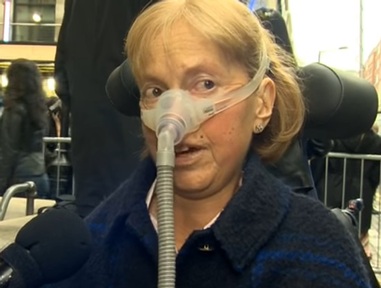People with disabilities will not be denied life-saving COVID-19 treatment says NHS England
People with disabilities will not be refused life-saving coronavirus treatment, NHS England has said, after a GP surgery told patients those with life-limiting illnesses ‘certainly will not be offered a ventilator bed’.

NHS England has said able-bodied people will not be prioritised for COVID-19 treatment.
The announcement comes in response to a letter signed by hundreds of disability charities and campaigners urging NHS doctors and nurses not to trample on the rights of disabled people.
Over 1,800 disability charities, campaigners and members of the public have now signed a COVID-19 disability rights statement, which was included in a letter sent to the NHS.
Stephen Powis, National Medical Director, NHS England responded to the charities’ letter, by writing to Baroness Jane Campbell of Surbiton.
Mr Powis wrote: ‘Decisions about the best course of action, treatment and care pathway are always made between a patient and their clinicians, and the NHS will always seek to fully protect the rights of people with disabilities, now and throughout the course of this global pandemic.’
‘Certainly will not be offered a ventilator bed’
Fears for the rights of people with pre-existing health conditions grew, after a GP surgery in Wales sent a letter to people with serious health problems including motor neurone disease, telling them to complete a 'do not resuscitate’ form in case their conditions worsened due to coronavirus.
Llynfi Surgery in Maesteg, South Wales, wrote to people with illnesses such as incurable cancer and told them not being resuscitated had ‘several benefits’.
It said people with life-limiting illnesses were at much higher risk of Covid-19 and were ‘unlikely to be offered hospital admission’ and ‘certainly will not be offered a ventilator bed’.
The GP surgery later apologised.
'Read about cases that have made us feel worried'
Concerns about the rights of people with disabilities were raised in a letter signed by Baroness Campbell, Baroness Tanni Grey-Thompson, Karen Myres of Right at Home Preston, Disability Rights UK, the National Autistic Society, the Voluntary Organisations Disability Group and other charities.
Baroness Campbell herself relies on care and needs a ventilator to help her breathe at night. She uses a wheelchair and a computer on which she types with one finger.
The charities’ letter stated: ‘We have read about cases that have made us feel worried that the principles on which the NHS are built are sometimes not being upheld.
'Our individual chance of benefiting from treatment, should we have Covid19, must not be influenced by how our lives are valued by society.
'Where we have existing health conditions or impairments that are unrelated to our chance of benefiting from treatment, they must not play any part in decision-making regarding our equal right to access such treatment.
‘We have the right to be fully involved in decisions about our own lives, including life and death decisions.’
The letter warned doctors and nurses must not ignore rights enshrined in law such as the Human Rights Act (1998), Mental Capacity Act (2005) the Equality Act (2010), United Nations Convention on the Rights of Persons with Disabilities (2006)
The Disability Unit in the Cabinet Office has recently published a coronavirus statement about disabled people, signed by the Care minister Helen Whately.
Referring to the European Convention of Human Rights, Care minister Helen Whateley, stated: "Where local authorities need to prioritise care during the coming period, there is an absolute obligation on them to meet everyone’s human rights as an absolute minimum.
“We are taking decisive action in order to save as many lives as possible and also ensure the highest levels of support for disabled people, their carers, and their families during this challenging time".
Care minister Helen Whately also stated: “In the coming period there will be more need for care services, but sickness and the need to isolate is likely to reduce the number of dedicated social workers and care staff available to support those in need.”
Chancellor's £750m boost for charities
Chancellor Rishi Sunak has announced a £750m package so charities can keep operating during the coronavirus pandemic.
Cash grants will be given direct to charities providing key services during the pandemic. £360m will be given directly to charities by government departments and £370m will go to local small charities delivering food, medicines and financial advice.
Charities can already benefit from the government's Job Retention Scheme. Age UK, which also supports The Silver Line helpline to combat loneliness, has already furloughed two thirds of its staff, after the government told all non-essential shops to close.
Latest News
 29-Jul-24
Dementia Bus gives carehome.co.uk staff insight into life with dementia
29-Jul-24
Dementia Bus gives carehome.co.uk staff insight into life with dementia
 27-Jul-23
UK's top home care agencies in 2023 revealed
27-Jul-23
UK's top home care agencies in 2023 revealed
 30-Nov-22
A quarter of older people keep their falls secret from family
30-Nov-22
A quarter of older people keep their falls secret from family
 29-Nov-22
'Covid-19 has not gone away' say terminally ill
29-Nov-22
'Covid-19 has not gone away' say terminally ill
 28-Nov-22
IT consultant who received poor care opens 'compassionate' home care business
28-Nov-22
IT consultant who received poor care opens 'compassionate' home care business